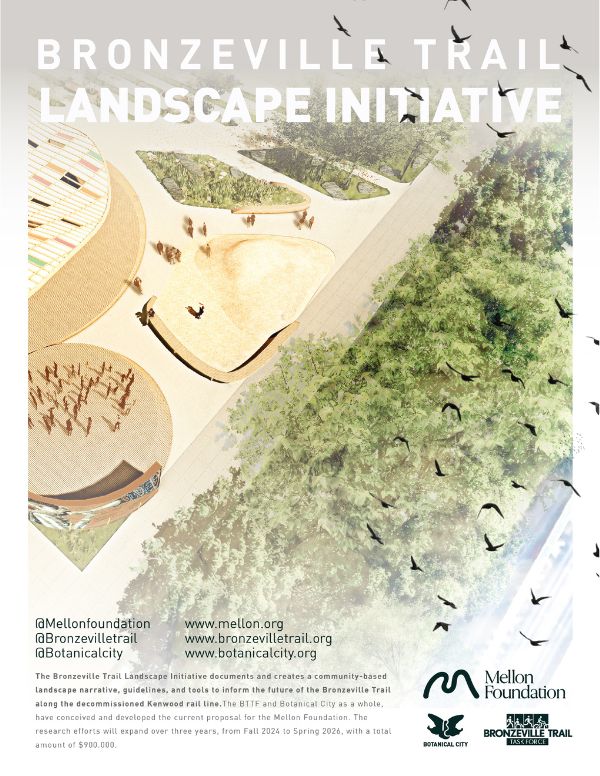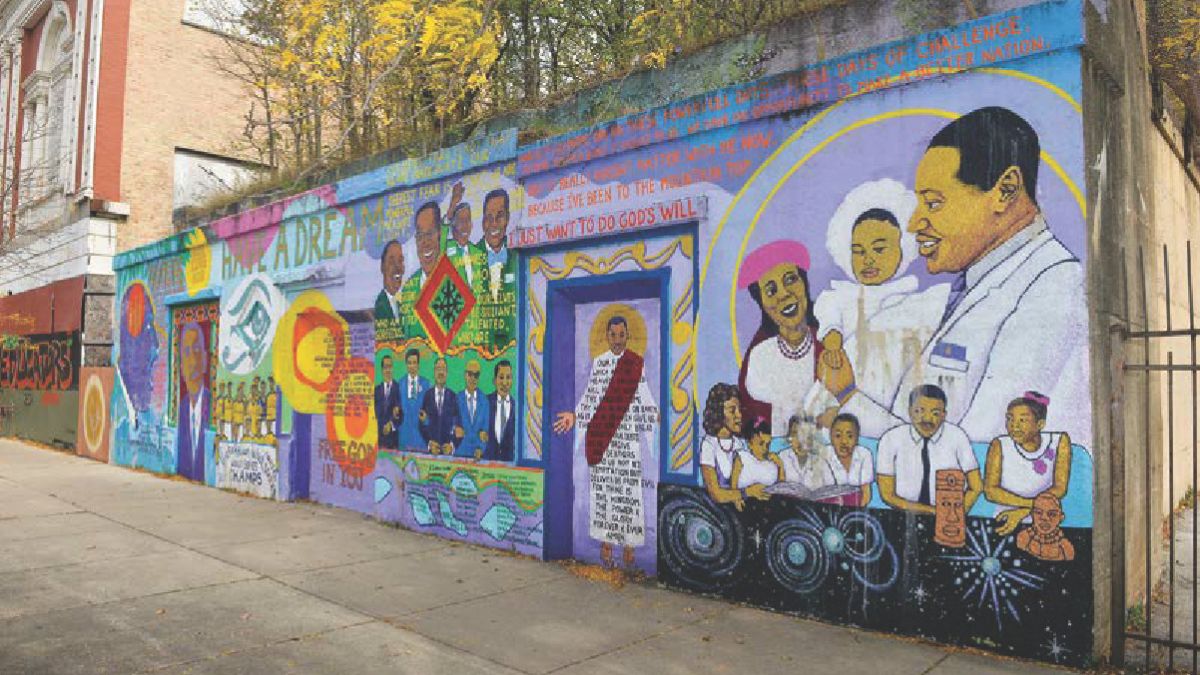Bronzeville Trail Task Force MLK Mural (Photo Provided).
Mr. Walter Freeman, Chairman of the Bronzeville Trail Task Force (BTTF) announced it is the recipient of a $900,000 grant from the Mellon Foundation for its Bronzeville Trail Landscape Initiative. Coming from the foundation’s “Humanities in Place” grant making area, the work of the initiative will evolve institutional and urban landscape research and design methodologies.
Upon news of the grant, John E. Adams, CPA and founder of the BTTF in 2020, was named Executive Director. The grant is for a three-year period and Adams will administer the funds and lead the Initiative. It is the first full-time paid position in the organizations’ short existence; all of the members until now are passionate, dedicated volunteers. Adams was named Executive Director in 2023 and has served since then for one dollar per year.
“I am humbled; it is truly an honor to serve as the first executive director of the BTTF,” said Adams. “Having a Bronzeville Trail in our community is a dream for myself, the board and residents. It will literally be transformative as we take old land, part of the defunct Kenwood Rail Line built by Black workers during the Great Migration and create a space to be viewed and enjoyed by bikers, runners, walkers and anyone who loves nature and the outdoors.”
Together with Botanical City, the BTTF created the Bronzeville Trail Research to develop the basis for urban policies and landscape strategies rooted in the specific history of Bronzeville and its residents. Botanical City is an urban and landscape design firm dedicated to rooting design justice by merging art and science to foster long-term creative processes that celebrate ancestral knowledge and connectivity across scales and time. Through investigative research, planning, and visual methods, Botanical City calls attention to endangered environments and the need for nontraditional public urban spaces. The team develops new intersections between art and science through landscape design strategies that support long-term creative processes.
In addition, the City of Chicago Department of Planning and Development announced that the BTTF has been as the City of Chicago’s Leadership Partner for the Illinois Department of
Commerce and Economic Opportunity’s State Designated Cultural District award for Bronzeville.
Illinois State Senator Mattie Hunter said, “I believe that the positive and lasting implications on the health and well-being of local residents, as well as on the cultural and economic opportunities would result in the promotion of Bronzeville for its historic value to Chicago and to the legacy of African American Chicagoans.”
The project, spearheaded by the BTTF, a not-for-profit organization based in the city, and its partner Botanical City, is focused on building support and community engagement to develop the Bronzeville Trail. They will engage a multidisciplinary team of planners, historians, ecologists, creatives, and technical experts to research the past and current cultural, ecological, and built environment. The project goals are aligned with the BTTF organization’s goal to cultivate and enhance the ecological, artistic, and historical richness of the future Bronzeville Trail. Fostering a vibrant, sustainable community space that supports wildlife, reduces urban pollution, and celebrates local culture and history is paramount to the project’s success.
The grant funding period is from Fall 2024 to Fall 2027 and includes two phases and six research activities, divided three activities in each phase. In phase one, a “Comprehensive Landscape Research, Documentation, and Dissemination” framework will be developed. In developing the framework they will conduct archival research, implement lived stories research, and advance blooming habitats and narratives. For phase two, BTTF and Botanical City will enhance landscape interpretation, vision and design. To accomplish this, they will foster landscape interpretation, create landscape performance and develop landscape principles and guidelines.

Rendering of the Landscape Initiative (Image Provided).
The project team champions a non-hierarchical, organic, collective, and collaborative structure, emphasizing governance principles. It will encourage open communication and allow diverse perspectives to shape the research and design process.
“It is important that we are inclusive every step of the way, for the community to have a buy-in and take their share of ownership in something that will have a positive impact on their lives and future lives,” said Adams.
An expanded BTTF organization will consist of John E. Adams, project director and new executive director who joined Infrastructure Engineering Inc. (IEI) as Corporate Controller in September 2022. Prior, Adams served as Chief Financial Officer of the Rainbow Push Coalition for over 16 years. As a Certified Public Accountant, he has supported and helped guide other nonprofits including the Abraham Lincoln Centre, Hales Franciscan High School, and the Westside Association for Community Action. Adams is the recipient of numerous awards, including the 2018 Chicago Defender Men of Excellence Award; Crain’s Chicago Business 2022, Notable Black Leaders and Executives Award; and the 2024 Archbishop James P. Lyke, O.F.M. African American Male Image Award. Earlier this year, Adams was elected to the National Leadership Council 2026 Class (Board of Directors) of the Association for the Study of African American Life and History (ASALH), an organization founded by Carter G. Woodson in Chicago at the Wabash YMCA in 1915. Woodson is the founder of Negro History Week, the predecessor to Black History Month.
Project Advisors will be the BTTF Board of Directors. Other positions, Project Manager, Project Assistant, Fund Development and Historian are all full-time positions that are yet to be filled. Botanical City’s positions will be Project Principal, Maria A. Villalobos H.; and Project Managers, Claudia Herasme and Gerardo Garcia. In 2022, the civil engineering firm, T. Y. Lin conducted its feasibility study on the embankment. BTTF has been working with Chicago city planners throughout the process.
In addition to the $900,000 Mellon Foundation grant, BTTF received $75,000 from Chicago Community Trust in 2022 for pre-development planning, and BTTF volunteers have raised
$350,000. Next year in 2025, the organization anticipates the city and county to invest more than $5.5 million in 2025 to launch the initial phase of the construction project. Total cost of the Bronzeville Trail is expected to cost about $100 million, comparable to the cost of the Bloomingdale 606 Trail on the northside of Chicago, which opened in 2016. At its core, the project is a health initiative, but like the effect the Bloomingdale Trail had on the northside, it is expected to induce hundreds of millions of dollars of investment in Bronzeville.
Person’s seeking additional information about the Bronzeville Trail project or the available positions visit the website www.bronzevilletrail.org or email Bronzevilletrail@gmail.com.



